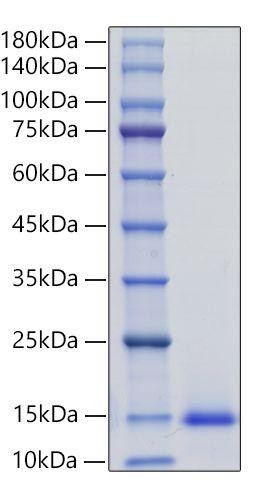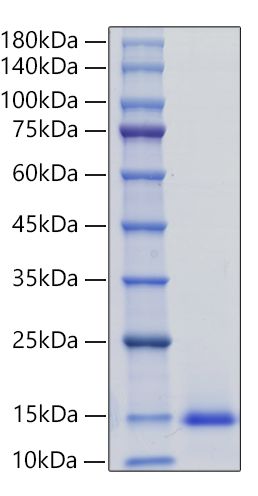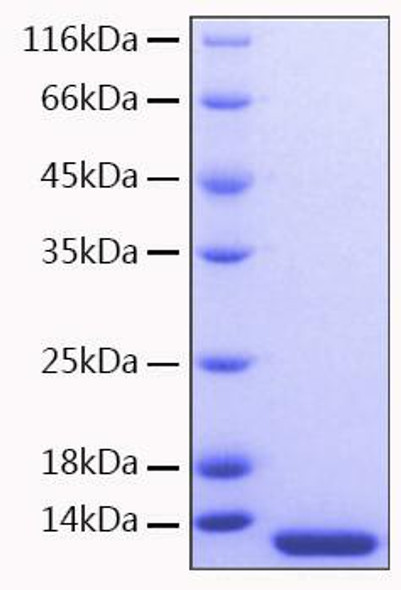Description
Recombinant Mouse CCL7/MCP-3 Protein
The Recombinant Mouse CCL7/MCP-3 Protein is a high-quality recombinant protein designed for murine biological research applications. This protein serves as an essential reagent in mouse model studies, comparative immunology research, and preclinical therapeutic evaluations, enabling scientists to investigate CCL7/MCP-3 biology and its relevance to human disease mechanisms through translational research approaches.
This product (SKU: RPCB1905) is produced using advanced expression systems and features a N-His tag for convenient detection and purification. The protein exhibits a calculated molecular weight of 9.35 kDa with an observed molecular weight of 15 kDa under denaturing conditions, achieving ≥ 95% as determined by SDS-PAGE., ensuring exceptional quality and consistency for research applications.
Key Features
| High Purity by Affinity Chromatography | |
| Mammalian & Bacterial Expression Systems | |
| High lot-to-lot consistency via strict QC |
| Product Name: | Recombinant Mouse CCL7/MCP-3 Protein |
| SKU: | RPCB1905 |
| Size: | 10 μg , 20 μg , 50 μg , 100 μg |
| Reactivity: | Mouse |
| Synonyms: | C-C motif chemokine 7, CCL7, chemokine (C-C motif) ligand 7, FIC, MARC, MCP-3, MCP3Monocyte chemotactic protein 3, MCP-3Small-inducible cytokine A7, MGC138465, Monocyte chemoattractant protein 3, NC28SCYA6, SCYA7MGC138463, small inducible cytokine A7 (monocyte chemotactic protein 3) |
| Tag: | N-His |
| Calculated MW: | 9.35 kDa |
| Observed MW: | 15 kDa |
| Gene ID: | 20306 |
| Protein Description: | High quality, high purity and low endotoxin recombinant Recombinant Mouse CCL7/MCP-3 Protein (RPCB1905), tested reactivity in Pichia and has been validated in SDS-PAGE.100% guaranteed. |
| Endotoxin: | < 0.1 EU/μg of the protein by LAL method. |
| Purity: | ≥ 95% as determined by SDS-PAGE. |
| Formulation: | Lyophilized from a 0.22 μm filtered solution of PBS, pH 7.4. |
| Reconstitution: | Centrifuge the vial before opening. Reconstitute to a concentration of 0.1-0.5 mg/mL in sterile distilled water. Avoid vortex or vigorously pipetting the protein. For long term storage, it is recommended to add a carrier protein or stablizer (e.g. 0.1% BSA, 5% HSA, 10% FBS or 5% Trehalose), and aliquot the reconstituted protein solution to minimize free-thaw cycles. |
| Storage: | Store at -20℃.Store the lyophilized protein at -20℃ to -80 ℃ up to 1 year from the date of receipt. After reconstitution, the protein solution is stable at -20℃ for 3 months, at 2-8℃ for up to 1 week. |
Mouse CCL7/MCP-3, a member of the beta subfamily of chemokines, was initially identified as a transcript that is induced in a mouse mast cell line after Fc epsilon RI triggering by IgE plus antigen.Mouse MARC/MCP-3 expression has also been detected during murine experimental allergic encephalomyelitis in the spinal cord, and in LPS-stimulated murine WEHI -3 cells and Swiss 3T3 cells where MARC expression is glucocorticoid-attenuated. Except for one amino acid subsititution, mouse MARC is identical to mouse FIC, the product of a growth factor-activated gene. Mouse CCR2, a mouse chemokine receptor, has been shown to bind JE/MCP-1 with high affinity and MARC/MCP-3 with lower affinity.







